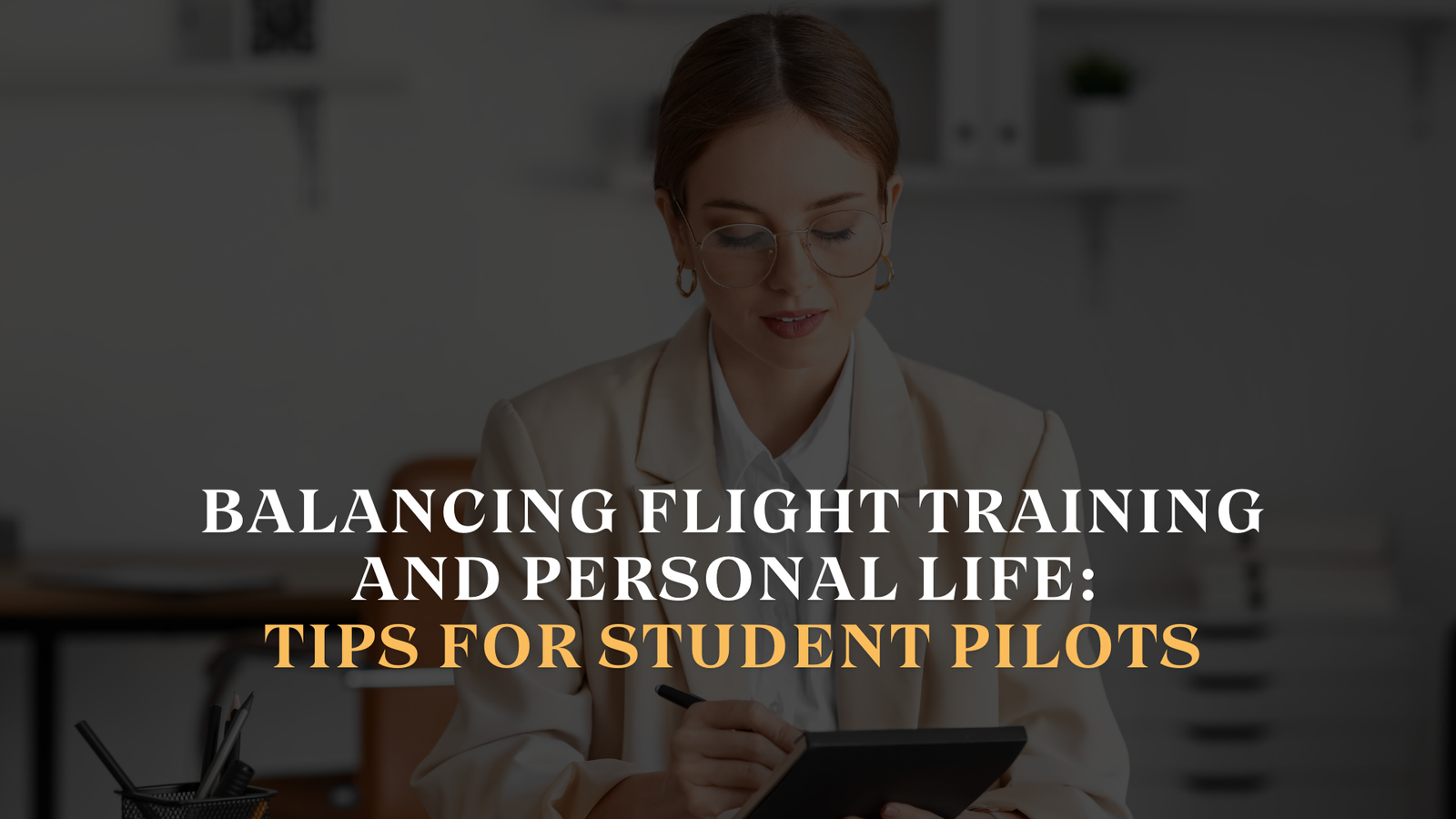Starting your journey as a student pilot is exciting, challenging, and life-changing. Every day brings new learning experiences, from mastering technical flying skills to understanding aviation theory and safety procedures. However, the demands of flight training can be intense. Long hours of study, simulator sessions, early morning flights, and constant assessments can make it hard to maintain a healthy personal life.
If you are not careful, you might find yourself overwhelmed, with little time left for friends, family, or relaxation. The good news is that with the right approach, you can balance your training schedule with your personal life, ensuring both your career and your well-being thrive.
In this blog, we will explore practical tips to help you manage your time, energy, and priorities effectively while in flight training.
1. Understand the Demands of Flight Training
Flight training is not like a regular classroom course. It requires both mental and physical preparation. You will spend hours on:
- Ground school lessons
- Simulator training
- Actual flight sessions
- Self-study and assignments
- Fitness and medical check-ups
Before starting your training, have a clear idea of how much time you will need to dedicate. This understanding will help you plan your personal life realistically. Speak with your instructors or senior students to know the typical weekly schedule so you can set expectations with yourself and your family.
2. Create a Realistic Schedule
One of the biggest challenges is poor time management. A well-planned schedule can help you stay on track.
Here’s what to keep in mind while making your schedule:
- Block out fixed training hours first.
- Allocate study hours in smaller, focused blocks instead of long, tiring sessions.
- Reserve specific time for personal activities like exercise, hobbies, or family calls.
- Include enough time for rest, as flying while tired can affect performance.
A balanced schedule avoids burnout and ensures that you make steady progress in training without sacrificing your personal connections.
Read Also – Safety & Support: Indian Students in South Africa Aviation
3. Prioritise Your Health
Your body and mind are your most valuable tools as a pilot. Fatigue, poor nutrition, or stress can affect your performance in the cockpit. Here’s how to maintain your health during training:
- Sleep: Aim for 7–8 hours every night. Lack of sleep affects decision-making and alertness.
- Nutrition: Eat balanced meals. Avoid too much caffeine or junk food, especially before flights.
- Exercise: Include light workouts like walking, jogging, or yoga to stay fit and reduce stress.
- Mental health: Don’t ignore signs of anxiety or burnout. Talk to friends, family, or a counsellor if needed.
4. Communicate with Family and Friends
When you are in flight school, your social life can take a hit. Early flights, weather delays, and last-minute schedule changes can make it hard to attend events or keep promises.
Be honest with your loved ones about your training schedule and workload. Explain that there may be times when you are not available. At the same time, try to make the most of your free moments by calling or meeting them. Even small gestures like sending a message can keep relationships strong.
5. Learn to Say ‘No’
Flight training requires discipline and focus. You may have to turn down social invitations or activities that interfere with your training or rest time. While it’s important to have fun, remember that this is a short-term sacrifice for a long-term goal.
Saying no does not mean cutting people off—it means protecting your time and energy so you can succeed without burning out.
6. Use Your Waiting Time Wisely
Aviation training often involves waiting—whether for weather to clear, aircraft availability, or instructor schedules. Instead of wasting this time scrolling on your phone, use it productively:
- Revise your notes
- Prepare for your next lesson
- Read aviation manuals
- Do short mental relaxation exercises
Small bursts of productive work during waiting periods can free up your evenings for personal activities.
7. Keep Hobbies Alive
Your hobbies can be a source of relaxation and stress relief. Even if you can’t spend hours on them, give yourself small moments to enjoy them. Listening to music, photography, reading, or sketching can help you unwind after a long day.
These activities keep you mentally fresh and prevent your life from revolving solely around training.
8. Stay Organised
Clutter and disorganisation waste time and add unnecessary stress. Keep your study materials, flight gear, and documents neatly arranged. Use a checklist for your training tasks and deadlines.
A well-organised setup means you spend less time looking for things and more time focusing on what matters.
9. Build a Support Network
Surround yourself with positive, supportive people—both inside and outside your flight school. Fellow students can share tips, study together, and motivate you during tough days. Family and friends can offer encouragement and help you keep perspective when you feel stressed.
10. Accept That Some Days Will Be Tough
No matter how well you plan, there will be days when training demands more time than expected, or when personal life takes priority. Accept that perfect balance is not always possible. The key is to adjust without guilt—catch up on personal time later, or work a bit harder when your schedule allows.
11. Avoid Comparing Yourself to Others
In flight training, every student progresses at their own pace. Some may solo faster, some may finish exams earlier, and some may need more practice hours. Comparing yourself to others can cause unnecessary stress. Focus on your own progress and improvement instead.
12. Celebrate Small Wins
Completing a challenging manoeuvre, passing a theory test, or getting good feedback from your instructor are all achievements worth celebrating. Reward yourself with a small treat or activity you enjoy. It keeps motivation high and makes the journey more enjoyable.
Final Thoughts
Balancing flight training and personal life is not about splitting your time 50–50—it’s about finding a rhythm that works for you. Sometimes training will take the lead, and other times personal life will. The important thing is to make conscious choices that support both your career goals and your well-being.
Remember, a healthy, happy pilot is a better pilot. By planning your time, caring for your health, staying organised, and keeping connections strong, you can enjoy your flight training journey without losing touch with the rest of your life.
Take Off with Top Crew Aviation
At Top Crew Aviation, we understand that becoming a pilot is not just about technical skills—it’s about managing your life and career together. Our experienced instructors, flexible training schedules, and supportive learning environment help you achieve your flying dreams without losing balance in your personal life.
If you’re ready to start your journey in aviation with a program designed for both professional excellence and personal well-being, join Top Crew Aviation today.


